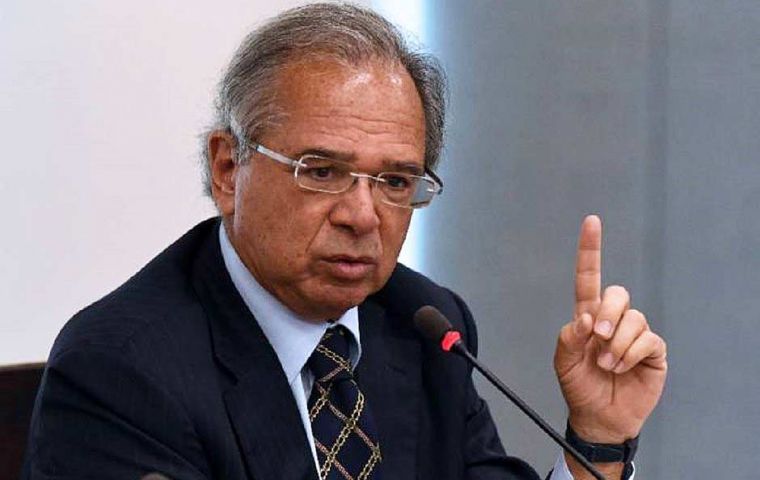MercoPress. South Atlantic News Agency
Economy Minister says Brazil's spending cap poorly constructed
 Guedes insisted any step backward from the current policies would be a mistake
Guedes insisted any step backward from the current policies would be a mistake Brazil's Economy Minister Paulo Guedes Friday admitted the spending ceiling needed to be pierced because it was poorly constructed, but he insisted that the federal spending cap remains a necessary tool to ensure the stability of public accounts.
“If you have a fireplace at home, it is good to have a chimney. A poorly constructed ceiling, if it catches fire in the house everyone dies asphyxiated. The [spending] ceiling was poorly constructed. In 2019, we arrived with the mentality 'More Brazil' to transfer resources to states and municipalities, but could not because it burst the ceiling, which was poorly built,” Guedes said in his first statement after the Oct. 30 presidential runoff during his appearance at an event marking the 30th anniversary of the Secretariat of Economic Policy (SPE).
The outgoing administration of President Jair Bolsonaro cut through the spending cap five times. The first was in 2019 when a constitutional amendment allowed the government to remove from the ceiling about R$ 60 billion transferred to states and municipalities after the review of the pre-salt onerous cession. In 2020, the ceiling was pierced again because of the War Budget, which allowed for the payment of Emergency Aid and aid to local governments in the first months of the COVID-19 pandemic.
The ceiling was pierced three more times. In 2021, the Emergency PEC, which resulted in the new fiscal framework, authorized the spending of R$ 44 billion for the payment of the second round of Emergency Aid. Still last year, the PEC of Precatórios released another R$ 110 billion outside the ceiling: about R$ 65 billion with the change in the formula for correcting the spending ceiling and around R$ 45 billion with the postponement of precatórios (debts recognized by the courts).
In July this year, another constitutional amendment released R$ 41.2 billion to increase the Brazil Allowance to R$600 and to create the Taxi Driver and Trucker allowances.
Guedes also said that an alleged conflict between social policies and fiscal irresponsibility exists due to the technical incapacity of previous governments. In his view, the current government has increased social spending without harming public accounts.
“We launched the best social program there has ever been, with fiscal responsibility. So, what is this story about a conflict between social and fiscal? This reveals ignorance, technical ignorance, and an inability to solve problems,” he stressed while reaffirming that the country was “walking the path to prosperity.” He also said it would be a mistake to take any step backward from the current economic policies.
About hunger in the country, Guedes argued that the problem existed before and that the current government “discovered the invisible” by creating the Emergency Aid in 2020. The program, which was in force in 2020 and 2021, targeted informal workers. In effect since the end of last year, Auxílio Brasil inherited the target population of Bolsa Família.
The minister also listed the economic achievements of the current administration, particularly the creation of Pix, the Central Bank's instant transfer system.
Besides Guedes, the event was attended by the Minister of Mines and Energy and former Secretary of Economic Policy, Adolfo Sachsida; the head of the Special Advisory for Economic Studies, Rogério Boueri; and the Secretary of Economic Policy, Pedro Calhman de Miranda. (Source Agencia Brasil)




Top Comments
Disclaimer & comment rulesCommenting for this story is now closed.
If you have a Facebook account, become a fan and comment on our Facebook Page!